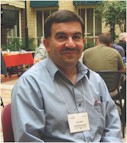 Stephen B. Aley, Ph.D., Professor, Department of Biological Sciences. He has worked and taught microbiology, parasitology, and bioinformatics since 1995, and is the PI and Program Director for the Howard Hughes Medical Institute Curriculum Grant at UTEP. He has extensive research experience in molecular biology and sequence analysis of human parasites (Giardia, Plasmodium), including five years involvement with genome project for Giardia lamblia. Current research interests include biochemistry and cell biology of Giardia lamblia, including host/parasite interactions and evolution of eurkaryotic organelles and biochemical pathways using bioinformatics computing tools. Dr. Aley is a member of the Executive Committee and Admission Committee in the Bioinformatics Program. Dr. Aley is the PI in the NIH-funded “Enhancement of Quantitative Science in Biology Curricula” and co-PI in the subcontract with Pittsburgh Supercomputing Center in NIH-funded projects for bioinformatics education and research. His expertise includes genome and sequence assembly techniques and the use of general bioinformatics computing tools. Stephen B. Aley, Ph.D., Professor, Department of Biological Sciences. He has worked and taught microbiology, parasitology, and bioinformatics since 1995, and is the PI and Program Director for the Howard Hughes Medical Institute Curriculum Grant at UTEP. He has extensive research experience in molecular biology and sequence analysis of human parasites (Giardia, Plasmodium), including five years involvement with genome project for Giardia lamblia. Current research interests include biochemistry and cell biology of Giardia lamblia, including host/parasite interactions and evolution of eurkaryotic organelles and biochemical pathways using bioinformatics computing tools. Dr. Aley is a member of the Executive Committee and Admission Committee in the Bioinformatics Program. Dr. Aley is the PI in the NIH-funded “Enhancement of Quantitative Science in Biology Curricula” and co-PI in the subcontract with Pittsburgh Supercomputing Center in NIH-funded projects for bioinformatics education and research. His expertise includes genome and sequence assembly techniques and the use of general bioinformatics computing tools.
 Igor Almeida, Ph.D., Edward and Barbara Brown Egbert Endowed Professor, Department of Biological Sciences. His research studies focus on structure and immunological roles of GPI-anchored glycoconjugates and lipids of Trypanosoma cruzi, trying to understand how the parasite modulates and evades the host immune response. His ultimate goal is the development of new therapeutic approaches for Chagas’ disease. His current five-year NIH-funded research project is a study on the molecular composition and function of T. cruzi shed vesicles. Also, he was involved in several collaborative studies with research groups from the US and abroad, aiming at the structural and functional characterization of glycoconjugates and lipids from various pathogens and disease vectors. Dr. Almeida is a member of the Research Committee in the Bioinformatics Program and has recently developed a web-based bioinformatics tool for glycosylation site prediction, OGPET, at Igor Almeida, Ph.D., Edward and Barbara Brown Egbert Endowed Professor, Department of Biological Sciences. His research studies focus on structure and immunological roles of GPI-anchored glycoconjugates and lipids of Trypanosoma cruzi, trying to understand how the parasite modulates and evades the host immune response. His ultimate goal is the development of new therapeutic approaches for Chagas’ disease. His current five-year NIH-funded research project is a study on the molecular composition and function of T. cruzi shed vesicles. Also, he was involved in several collaborative studies with research groups from the US and abroad, aiming at the structural and functional characterization of glycoconjugates and lipids from various pathogens and disease vectors. Dr. Almeida is a member of the Research Committee in the Bioinformatics Program and has recently developed a web-based bioinformatics tool for glycosylation site prediction, OGPET, at
 Ricardo Bernal, Ph.D., Associate Professor, Department of Chemistry. The research interests of Dr. Bernal are primarily focused on the mechanisms that lead to the efficient and precise assembly of large macromolecular complexes from heterogeneous subunits. One project includes the three dimensional structure determination of bacteriophages that infect Pseudomonas aeruginosa, a human pathogen. These bacteriophages have been isolated from natural environments such as lakes and rivers. One of these viruses, bacteriophage EL, is an unusually large phage with a genome that is 211,215bp in length and has 201 predicted open reading frames. One of these open reading frames encodes a chaperonin that is similar to the E. coli GroEL chaperonin. His lab is currently working on the structure of this first and only known virus encoded chaperonin. Another focus of his lab is on the structure determination of V-type ATPases from various organisms. V-ATPases are enzymes that utilize the energy derived from ATP hydrolysis to pump protons against concentration gradients. These ATPases acidify organelles such as the yeast vacuole or can be utilized by cells such as osteoclasts to degrade bone. He will provide bioinformatics tools for cryo-EM data analysis, macromolecular assembly and X-ray crystallography analysis. Ricardo Bernal, Ph.D., Associate Professor, Department of Chemistry. The research interests of Dr. Bernal are primarily focused on the mechanisms that lead to the efficient and precise assembly of large macromolecular complexes from heterogeneous subunits. One project includes the three dimensional structure determination of bacteriophages that infect Pseudomonas aeruginosa, a human pathogen. These bacteriophages have been isolated from natural environments such as lakes and rivers. One of these viruses, bacteriophage EL, is an unusually large phage with a genome that is 211,215bp in length and has 201 predicted open reading frames. One of these open reading frames encodes a chaperonin that is similar to the E. coli GroEL chaperonin. His lab is currently working on the structure of this first and only known virus encoded chaperonin. Another focus of his lab is on the structure determination of V-type ATPases from various organisms. V-ATPases are enzymes that utilize the energy derived from ATP hydrolysis to pump protons against concentration gradients. These ATPases acidify organelles such as the yeast vacuole or can be utilized by cells such as osteoclasts to degrade bone. He will provide bioinformatics tools for cryo-EM data analysis, macromolecular assembly and X-ray crystallography analysis.

Olac Fuentes, Ph.D., Professor, Department of Computer Science. His major research area is machine learning and its applications to scientific data analysis, computer vision, robotics, and natural language processing. He is a member of the Colloquium Committee and Research Committee in the Bioinformatics Program. With his extensive research experience in machine learning, Dr. Fuentes is a supervising faculty in the project “RNAVLab: Virtual Laboratory for RNA Structure Predictions” funded by Texas ARP. His expertise includes the integration of machine learning techniques in developing bioinformatics computing tools, especially in areas related to RNA structure prediction methods.

Vladik Kreinovich, Ph.D., Professor, Department of Computer Science. His research interests include interval computations and intelligent control. He is a member of the Executive Committee and Admission Committee in the Bioinformatics Program as a representative from the Department of Computer Science. He is a member of the editorial boards of many prestigious journals in his research areas, such as the International Journal of Reliable Computing, Journal of Applied Statistics and Intelligent Technology, and International Journal of Interval Computations. As a co-PI in the NSF-funded "CREST Cyber-ShARE Center of Excellence: A Center for Sharing Cyberresources to Advance Science and Education" and co-I in the NIH-funded “Enhancement of Quantitative Science in Biology Curricula,” Dr. Kreinovich has expertise using intelligent computing systems in data processing under uncertainty and intelligent data processing techniques for bioinformatics computing problems.

Ming-Ying Leung, Ph.D., Professor, Department of Mathematical Sciences, and Director, Bioinformatics and Computational Science Programs. Research interests include probabilistic modeling and statistical bioinformatics, focusing on applications of Markov models, Poisson approximations, and the scan statistics to DNA sequence analysis. Her current research theme is to develop a fast, efficient way to predict the 2-dimensional structures of ribonucleic acids (RNA) used by some viruses as their genomes (e.g., West Nile virus). As the PI for five research projects since 2003, Dr. Leung received grants from NIH, NSF, and Texas NHARP. In addition, she has also been co-PI or co-investigator for other NSF or NIH grants. She serves as a referee for many journals, reviewer for NIH and NSF grants, and members of various editorial boards and external advisory boards. Dr. Leung provides bioinformatics support services mainly in molecular sequence analysis, microarray analysis, RNA structure prediction, and DNA replication origin prediction.

Mahesh Narayan, Ph.D., Professor, Department of Chemistry. His research interests include the investigation of mechanism of chaperone catalyzed protein folding reactions in order to develop small molecule mimics that can serve as chemotherapeutics. Folding studies on biomedically relevant proteins to unravel key intramolecular interactions that stabilize the native state. He also develops nanobiotechnological vehicles for drug delivery. Awards and Activities: European Union Travel Award; American Chemical Society Honorarium. Dr. Narayan is a member of the Research Committee and Chair of the Colloquium Committee in the Bioinformatics Program. His expertise includes proteomics, X-ray crystallography, and protein folding dynamics.

Elizabeth Walsh, Ph.D., Professor, Department of Biological Sciences, and Interim Dean, College of Science. NSF-funded research in molecular systematics and genotyping. Research interests include molecular systematics and evolutionary genetics. One of the NSF-funded ongoing projects is “Community Composition and Phylogeny of Basal Consumers in Chihuahuan Desert Waters” and she is serving as the Director for BBRC Toxicology Unit. Dr. Walsh is co-I in the NIH-funded “Enhancement of Quantitative Science in Biology Curricula” and a member of the Executive Committee and Research Committee in the Bioinformatics Program. She is actively involved in teaching bioinformatics core courses and supervising research projects for bioinformatics students, especially in their training of using bioinformatics computing tools. Her expertise as a BCL resource faculty includes general bioinformatics computational software, evolution and phylogenetic analysis, and toxicogenomics.

Chuan "River" Xiao, Ph.D., Professor, Department of Chemistry. Research interests are mainly on viruses, which are small nano-machines that are assembled accurately from proteins and nucleic acids within the host cell. Understanding the assembly process can lead to not only the prevention of the harmfulness of viruses but also their utilization for biomedical purposes. His research focuses on the studies of viral assembly by combination of the structural determination techniques of cryo-EM and X-ray crystallography. Dr. Xiao is currently Chair of the Colloquium Committee in the Bioinformatics Program.
|

